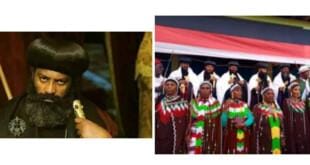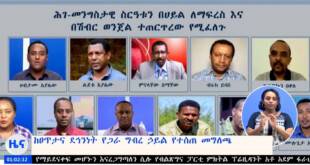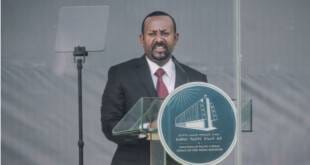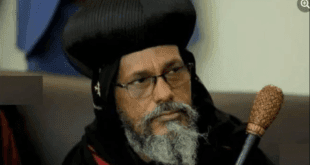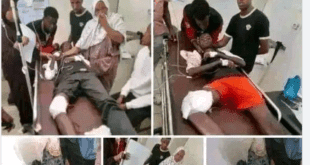WORTHINGTON — The Oromo Awareness Event hosted Sunday at Grace Community Church was a celebration of Oromo culture as well as an opportunity to raise awareness of the conflicts facing Ethiopia’s largest ethnic group.
Population-wise, Oromia makes up about 40 percent of Ethiopia. However, the Oromo people have been disenfranchised by the Tigray People Liberation Front (TPLF) since it became a communist part in the early 1990s, and lack representation in parliament.
In 2014, the Oromo people began protesting against the government’s discriminatory practices, which resulted in a “brutal crackdown,” according to Human Rights Watch.
The government resisted the protests, and their efforts came to a boiling point on Oct. 2, 2016, when Ethiopian security forces fired bullets and released tear gas on a crowd of more than 2 million peaceful Oromo protesters, resulting in the death of hundreds of civilians.
Things became even worse just days later as the government imposed a state of emergency, blocking internet access and peaceful assembly. The violence and oppression left many to flee the country. Chaltu Uli, now an eighth-grader at Worthington Middle School, was one of the many Oromo people to leave the country in 2014.
Uli was shocked by the killing of civilians last October — so much so she was motivated to do something about it.
“When I heard that, I cried in school all day,” Uli said. “But that’s when I realized I wanted to help them.”
With the help of Kelly Moon, English immersion teacher at WMS, Uli has sold more than $500 worth of Oromo bracelets. The goal was to raise money to make a film about the Oromo people and the many human rights violations they have endured.
More Believe, a Minneapolis multimedia organization, had its cameras rolling Sunday at the awareness event to create a film. In addition to many prominent speakers from the Oromo community, the event also featured Oromo poems, prayer, food and coffee.
Uli is not done raising money — any additional funds will go toward helping the Oromo people in refugee camps, where many people are dying of injuries and starvation.
About 40,000 Oromo people live in Minnesota, and more than 500 in the Worthington area. However, as Oromo Community of Minnesota President Teshite Wako pointed out Sunday, they aren’t talked about much and are often confused with Somali people.
“We don’t make much noise,” Wako said. “That’s the difficulty we have.”
At the heart of the Oromo people’s struggle is the lack of a voice — that nobody really knows about their struggle, despite the ethnic group’s large population and the Ethiopian government’s many human rights violations. The ultimate goal for Uli, and others fighting for the cause, is to alert the U.S. government of the problem.
UFCW Local 1161 President Mike Potter spoke at the event, urging those in attendance to let US. Rep. Tim Walz know what is going on more than 7,000 miles away.
“We need to go and have a conversation with Tim Walz — to have a voice in Washington, D.C. to tell them to stop sending funding to Ethiopia,” Potter said. “If the politicians really knew what was happening with that money, they would be appalled.”
Wako agreed, calling on the U.S. to stop enabling the government of Ethiopia. The U.S. gave Ethiopia $3.8 billion last year, and Wako said the Oromo people didn’t see a dime of it.
In addition, United States National Security Advisor Susan Rice said the 2015 elections were “absolutely — 100 percent” democratic, another example of how the Oromo people’s struggle has not been recognized.
“There’s no freedom of speech, freedom of voting,” Wako said. “Not for the Oromo people. We don’t have a democratic process right now.”
Though they do not have a voice in Ethiopia, Oromo activists have made some progress on educating the U.S. government on the crisis.
Seenaa Jimjimo, president of the Coalition for Oromo Human Rights and Democracy, testified before the Senate Foreign Affairs Committee in March about the crisis affecting Ethiopia.
Last Wednesday, her efforts were rewarded, as Sen. Benjamin Cardin, D-Maryland, introduced “Senate Resolution 168 — A resolution supporting respect for human rights and encouraging inclusive governance in Ethiopia.” It accompanies House Resolution 128, and represents a huge step in the U.S. government’s acknowledgement of the Oromo people. Now, the goal is to push representatives and Senators to support the resolution.
Speaking at the event, Jimjimo stressed that there was more work to be done, but also took time to congratulate Worthington’s youngest activist.
“I was impressed and moved by Chaltu’s action,” Jimjimo said. “That’s why I’m here. She is inspirational to me, personally.”
http://www.dglobe.com/
